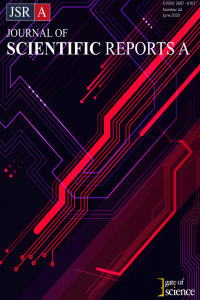PERFORMANCE ASSESSMENT OF LANDSAT 8 AND SENTINEL-2 SATELLITE IMAGES FOR THE PRODUCTION OF TIME SERIES LAND USE/LAND COVER (LULC) MAPS
PERFORMANCE ASSESSMENT OF LANDSAT 8 AND SENTINEL-2 SATELLITE IMAGES FOR THE PRODUCTION OF TIME SERIES LAND USE/LAND COVER (LULC) MAPS
Landsat 8, Land use map, Land cover map Sentinel-2, Unsupervised classification,
___
- [1] Townshend, J.R.G., (1992), Improved global data for land applications. A proposal for a new high resolution data set. Report of the Land Cover Working Group of IGBP-DIS, Global Change Report (Sweden).
- [2] Duku, E., Mattah, P.A.D., and Angnuureng D.B., (2021), Assessment of land use/land cover change and morphometric parameters in the keta lagoon complex ramsar site, ghana, Water (Switzerland). 13 2537.
- [3] Ekumah B., Armah, F.A., Afrifa, E.K.A., Aheto, D.W., Odoi, J.O. and Afitiri,A., (2020) Assessing land use and land cover change in coastal urban wetlands of international importance in Ghana using Intensity Analysis, Wetl Ecol Manag. 28, 271-284.
- [4] Ma, Z., Liu, Z., Zhao, Y., Zhang, L., Liu, D., Ren, T., Zhang, X., and Shaoming, Li,(2020), An unsupervised crop classification method based on principal components isometric binning, ISPRS Int J Geoinf. 9(11, 648).
- [5] Karra, K., Kontgis, C., Statman-Weil, Z., Mazzariello, J.C., Mathis, M., Brumby, S.P., (2021), Global land use / land cover with Sentinel 2 and deep learning, in: 2021 IEEE International Geoscience and Remote Sensing Symposium IGARSS, 4704–4707.
- [6] Zanaga, D., van de Kerchove, R., de Keersmaecker, W., Souverijns, N., Brockmann, C., Quast, R., Wevers, J., Grosu, A., Paccini, A., Vergnaud, S., Cartus, O., Santoro, M., Fritz, S., Georgieva, I., Lesiv, M., Carter, S., Herold, M., Li, L., Tsendbazar, N.E., Ramoino, F., Arino, O., (2021), ESA World Cover 10 m 2020 v100.
- [7] Enderle, D.I.M., Weih R.C. (2005), Integrating Supervised and Unsupervised Classification Methods to Develop a More Accurate Land Cover Classification, J Ark Acad Sci. 59, 10.
- [8] Olofsson, P., Foody, G.M., Herold, M., Stehman, S.V., Woodcock, C.E., Wulder, M.A., (2014), Good practices for estimating area and assessing accuracy of land change, Remote Sens Environ. 148, 42–57.
- [9] Khan, A., Hansen, M.C., Potapov, P., Adusei, B., Stehman, S.V., Steininger, M.K., (2021), An operational automated mapping algorithm for in-season estimation of wheat area for Punjab, Pakistan, 42, 3833–3849.
- [10] Pickens, A.H., Hansen, M.C., Hancher, M., Stehman, S.V., Tyukavina, A., Potapov, P., Marroquin, B., Sherani, Z., (2020), Mapping and sampling to characterize global inland water dynamics from 1999 to 2018 with full Landsat time-series, Remote Sens Environ. 243, 111792.
- [11] Ying, Q., Hansen, M.C., Potapov, P.V., Tyukavina, A., Wang, L., Stehman, S.V., Moore, R., Hancher, M., (2021), Global bare ground gain from 2000 to 2012 using Landsat imagery, Remote Sens Environ. 194, 161–176.
- [12] Potapov, P., Li, X., Hernandez-Serna, A., Tyukavina, A., Hansen, M.C., Kommareddy, A., Pickens, A., Turubanova, S., Tang, H., Silva, C.E., Armston, J., Dubayah, R., Blair, J.B., Hofton, M., (2021), Mapping global forest canopy height through integration of GEDI and Landsat data, Remote Sens Environ. 253, 112165.
- [13] Hansen, M.C., Potapov, P.V., Moore, R., Hancher, M., Turubanova, S.A., Tyukavina, A., Thau, D., Stehman, S.V., Goetz, S.J., Loveland, T.R., Kommareddy, A., Egorov, A.V., Chini, L., Justice, C.O., Townshend, J.R.G., (2013), High-resolution global maps of 21st-century forest cover change, Science. 342 (6160), 850-853.
- [14] Zengin, E., A Combined Assessment of Sea Level Rise (SLR) Effect on Antalya Gulf (Türkiye) and Future Predictions on Land Loss, (2023), Journal of the Indian Society of Remote Sensing.
- [15] Paris, C., Bruzzone, L., Fernandez-Prieto, D., (2019), A Novel Approach to the Unsupervised Update of Land-Cover Maps by Classification of Time Series of Multispectral Images, IEEE Transactions on Geoscience and Remote Sensing. 57, 4259–4277.
- [16] Lemenkova, P., (2021), ISO Cluster classifier by ArcGIS for unsupervised classification of the Landsat TM image of Reykjavík, Bulletin of Natural Sciences Research. 11 29–37.
- [17] U.S. Geological Survey 2018 Landsat collections: U.S. Geological Survey Fact Sheet, (2018), 3049.
- [18] Lemenkova, P., (2021), ISO Cluster Classifier by ArcGIS for Unsupervised Classification of the Landsat TM Image of Reykjavik Iso Cluster Classifier By Arcgis For Unsupervised Classification Of The Landsat Tm Image Of Reykjavík, Bulletin of Natural Sciences Research, 11, 29–37.
- [19] Altman, N.S., (1992), An introduction to kernel and nearest-neighbor nonparametric regression, American Statistician. 46 175–185.
- [20] Abburu, S., Babu Golla, S., (2015), Satellite Image Classification Methods and Techniques: A Review, Int J Comput Appl. 119 20–25.
- [21] Ahady, A.B., Kaplan, G., (2022), International Journal of Engineering and Geosciences Classification comparison of Landsat-8 and Sentinel-2 data in Google Earth Engine, study case of the city of Kabul, International Journal of Engineering and Geosciences. 7, 24–31.
- [22] Ghayour, L., Neshat, A., Paryani, S., Shahabi, H., Shirzadi, A., Chen, W., Al-Ansari, N., Geertsema, M., Amiri, M.P., Gholamnia, M., Dou, J., Ahmad, A., (2021), Performance evaluation of sentinel-2 and landsat 8 OLI data for land cover/use classification using a comparison between machine learning algorithms, Remote Sens (Basel), 13, 1349.
- Başlangıç: 2020
- Yayıncı: Kütahya Dumlupınar Üniversitesi
THE ROLE OF MHD WAVES IN HEATING OF THE SOLAR CORONA
Ebru BAŞ, Dicle ZENGİN ÇAMURDAN
MULTI-METAL RECOVERY FROM FLOTATION TAILINGS WITH CITRIC ACID ON THE NACl MEDIA
A NEW FORCE MEASUREMENT MECHANISM IN WIND TUNNEL: CFD AND EXPERIMENTAL VALIDATION ON A CYLINDER
EVALUATION OF GROUND VIBRATION AND AIR BLAST MEASUREMENTS INDUCED BY BLASTING IN A QUARRY MINE
TRANSPORTATION OF SPOROSARCINA PASTEURII IN POROUS MEDIA WITH DIFFERENT PARTICLE SIZES
Selda DOĞAN, Hatice FİDAN, Nefise ŞAHİN
Muhammet Kaan YEŞİLYURT, Nesrin ADIGÜZEL, Orhan YILDIRIM, Ömer ÇOMAKLI, Faraz AFSHARİ
